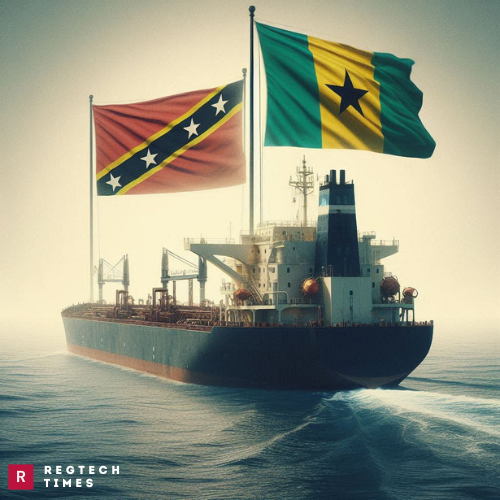In response to the sanctions imposed by Western nations following Russia’s invasion of Ukraine in 2022, Russian oil tankers have adopted a strategy known as flag switching to evade international oversight. This practice allows vessels to change their national registration, enabling them to continue transporting Russian oil to non-Western markets, such as India and China, despite sanctions aimed at limiting Moscow’s revenue.
Flag Switching: A Legal Loophole in the Shipping Industry
One prominent example of flag switching is the case of the Jaguar, a Russian oil tanker that transported oil from a port near St. Petersburg, Russia, to India. Initially registered under the flag of St. Kitts and Nevis, the tanker completed its journey and then changed its registration to fly the flag of Gabon, a nation in Central Africa.
This shift in registration, or flag switching, is a standard procedure in the maritime industry. By doing so, the Jaguar and other vessels effectively move out of the regulatory reach of Western financial authorities. This strategy has allowed Russian oil tankers to operate beyond the enforcement of sanctions aimed at restricting Russian oil exports.
Russia’s Dark Fleet and Its Role in Oil Exports
Flag switching is part of a broader trend that has given rise to what is referred to as the dark fleet. This term describes a group of ships that have concealed ownership structures, making it difficult for Western authorities to identify and seize assets linked to the Russian government or its allies. These ships play a critical role in transporting Russian oil to countries like India and China, which are not subject to the sanctions imposed by the U.S., U.K., and European Union.
Western sanctions allow Russia to continue selling oil but impose a price cap designed to reduce Moscow’s profits. Through flag switching and the use of the dark fleet, Russian tankers are able to evade these price caps, selling oil to non-sanctioning countries at higher market prices. This tactic helps Russia maintain its oil revenues, even under stringent financial restrictions.
Cybercrime Crackdown: Russian Authorities Arrest 96 in Major Money Laundering Operation
Ties to Western Jurisdictions
Despite the practice of flag switching, many of these tankers maintain connections to Western jurisdictions. For example, the St. Kitts and Nevis registry, used by the Jaguar before it switched flags, is operated out of the United Kingdom. Similarly, other shipping registries, such as those of Liberia and the Marshall Islands, manage their operations from offices near Washington, D.C.
However, the complexity of maritime law and the independent nature of these registries have made it difficult for Western authorities to regulate or sanction these vessels. The globalized nature of the shipping industry, combined with legal loopholes, allows ships like the Jaguar to evade financial controls through flag switching and continue operating outside the scope of Western sanctions.
Legal and Regulatory Challenges
The ability of Russian oil tankers to employ flag switching raises questions about the effectiveness of current sanctions. As of now, it is unclear whether foreign ship registries based in countries like the U.K. are obligated to comply with Western sanctions. The British Foreign Office has indicated that it is still determining the legal obligations of registries such as that of St. Kitts and Nevis, which are managed from British territory.
The U.S. Treasury and Justice Departments have not provided public comments on the issue, adding to the regulatory uncertainty surrounding the enforcement of sanctions against Russian oil tankers. The complexity of international shipping laws, combined with the practice of flag switching, has thus far allowed Russian vessels to evade the financial controls designed to limit their operations.
Russian Oil Exports Continue Through Non-Western Markets
Despite the sanctions, Russia has managed to maintain its oil exports through flag switching and the use of the dark fleet. India and China, two major buyers of Russian crude oil, have continued to purchase oil at market prices, unrestricted by the Western-imposed price cap. This has provided Russia with a crucial revenue stream, enabling it to mitigate the impact of sanctions on its economy.
Countries that provide flags of convenience to these tankers have also played a significant role in Russia’s ability to evade sanctions. Nations like Gabon, which are not bound by the same regulatory frameworks as Western countries, offer foreign vessels the opportunity to register under their flags with minimal oversight.


